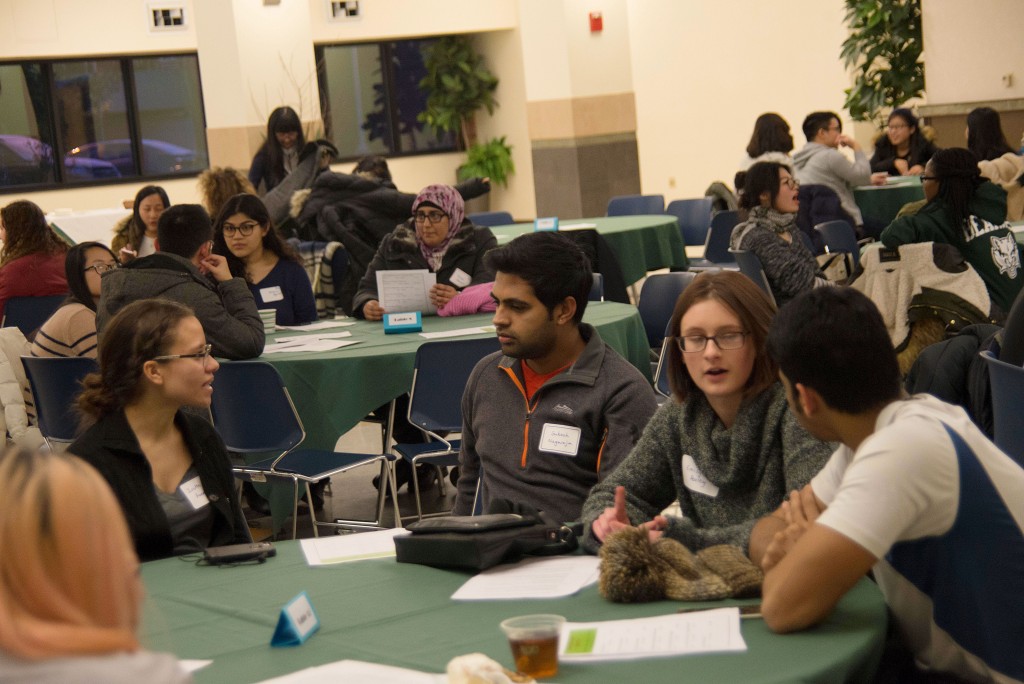
Finding a foreign language class at Binghamton University is not hard; students can take courses in Russian, Italian, Korean and many more. But sometimes, the challenge comes from practicing English.
That is where the English as a Second Language (ESL) Program comes in. Established at BU in 1984, it serves to give support to non-native English speakers — a major component of which has been the voluntary ESL English Conversation Pairs Program. At an introductory session, native English speakers and ESL students sit down at tables, meet one another and break off into pairs. After that, pairs meet once a week, engaging in conversation and providing the student with a point of reference regarding the English language outside of the classroom.
“We’re trying to get students used to academic English in our classes,” said Jennifer Brondell, the ESL program director. “But this kind of program is more a way for students to have more access to English. Because a lot of students, they’ll come to the United States and they’re surrounded by English and don’t have a lot of opportunities to practice it.”
Qiao Zhou, an ESL student and a sophomore majoring in accounting, said she was in the program last semester, but returned because of the friendships it fostered.
“Normally, my friends are all Chinese and not really any Americans,” Zhou said. “I got to meet more people. [It’s fun] running into each other on campus, and doing activities like Spring Fling or CIW Casino.”
Native English speaker Christina Rorke, a junior majoring in economics, said the relationship she had with her partner last semester was mutually beneficial.
“I heard about it through my friend who’s a linguistics major, and it sounded like a fun thing to do,” she said. “When I came for the first day last time, I met my partner and she taught me so much about China. It’s so different than America. You learn so much.”
Brondell said the program was unique in the way that it was not just helpful for the ESL student, but also for the native English speaker.
“You can look from a distance and be like, oh, that’s the Chinese group; oh, they all speak Arabic over there,” she said. “But when you meet the person and you make a connection, all the differences fall away. And that’s when we really become internationalized, when we become global citizens. I think that’s what Binghamton wants to promote.”
Learning about her partner’s culture was one of the best parts of being a part of the program, Rorke said, and well worth the time put into it.
“You set aside an hour once a week, we’d meet a lot in the Union on Sundays because it’s quiet,” she said. “We went to the Nature Preserve once, and just talked about everything. She’d explain her classes to me, what it’s like at home. She told me all about the holidays, she cooked for me. It was really nice.”
Brondell described that connection is a fundamental part of breaking down international barriers.
“We’re all just humans, and it’s really cool when the experience turns into a friendship,” she said. “And that’s when people open up their eyes to the rest of the world. It’s by meeting other people, it’s not always by taking a class, it’s human-to-human conversation.”
Gladys Xiang, an undeclared freshman, said that conversation was why she came to the meet-up.
“I came here to meet more people, and make more friends,” she said. “I’m looking for a partner and for more, for constant friendship.”
The Conversation Pairs coordinator, Trena Haffenden, added that the program is still looking for native English speakers to participate, as they have more ESL students looking to participate than the former. More can be found out on their website.


